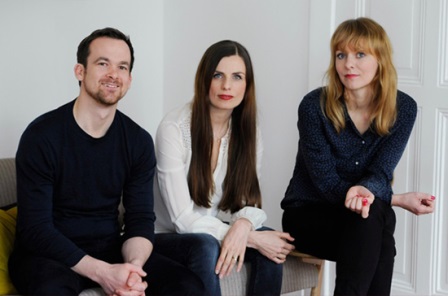'Toni Erdmann' producers Jonas Dornbach and Janine Jackowski and director Maren Ade (r). Image courtesy of Komplizen Film.
Berlin-based producer Janine Jackowski is speaking to IF at the tail-end of a working holiday in Oz.
She’s been travelling with her husband and two children for three months, fitting in promotional duties for her new film, Maren Ade’s wildly acclaimed Toni Erdmann, as she goes.
The German feature, out in Australian cinemas today via Madman, was the toast of last year’s Cannes, and an American remake is on the way – set to star Jack Nicholson and Kristen Wiig.
This is Jackowski’s third time in Sydney, after a visit at 14 – “I fell in love with Sydney and always wanted to come back” – and a trip to the Sydney Film Festival with Ade’s previous film, Everyone Else, in 2010.
Jackowski met Ade at film school in Munich, and has produced all her films since. The two have their own company in Berlin, Komplizen Film.
Toni Erdmann was financed as a German-Austrian co-production. Its final budget was made up with contributions “from film funds, television [rights], distribution MGs and world sales MGs,” says Jackowski.
Ade came up with the first idea for the film in 2010, and had a "more or less" final script by 2013, says the producer. The film was shot in 2014 before premiering in Cannes, to critical cartwheels, last year.
Jackowski describes the festival experience as “unbelievable”.
“We got the invitation for Un Certain Regard something like three weeks before the press conference where they announced [the line-up], and we were always secretly hoping to get an upgrade to the competition,” she says. “But we knew it would be very unusual, because Maren’s films have not been shown in Cannes before and it’s a comedy. But we were hoping for it.”
The night before the press conference, Jackowski got the call: they were in competition. The producer describes the next three weeks, racing to get the film completed in time, as a blur.
“We finished mixing the film on Monday, watched the final DCP Tuesday, went shopping for clothes on Wednesday and on Thursday we went to Cannes. It was all such a rush, and then we were overwhelmed by what happened in Cannes. The first screening was so amazing.”
The producer was accompanied to the premiere by the film’s stars, Sandra Hüller and Peter Simonischek, who won the lead roles after an extensive casting process in which Ade auditioned “a trillion combinations of father-daughter,” according to Jackowski.
Complicating the film’s shoot was the fact that both leads were performing in plays at the same time, flying back and forth between Berlin, Vienna and Bucharest. “It was really difficult to schedule the shooting,” says Jackowski.
As a result of “unstable weather conditions”, the producer also had to contend with a longer shooting schedule than the one budgeted: the mixed Romanian-German-Austrian crew ended up working for 56 days instead of the planned 48.
Cushioning these ups and downs was the cast’s level of preparation. “Maren is a big fan of rehearsal,” says Jackowski. “The rehearsal process took over one year.”
“There was one block [of rehearsal] one year before the shooting and then Maren went back to the script and changed it. And then six months prior to the shoot there was another rehearsal of two weeks or so, and then back to the script again to make a few changes.”
The filmmaker also continued to rehearse during the shoot, particularly before one surreal scene in which the principals take their kit off.
“The actors are mostly all theatre actors, so they have had their experiences with nakedness before,” says Jackowski.
“At some point everybody is naked, so they were quite comfortable. Also it’s very rare to have a nudity scene that is not connected with sex. I think that was an experience that they all really liked in the end.”
Jackowski was in Sydney when she heard that Toni Erdmann had been nominated for Best Foreign Language Film at the Oscars, confirming its status as the rare German feature to break out internationally.
Raising finance in Europe’s independent sector is becoming “more and more difficult,” the producer says.
“Every film we do is an international co-production. We really hope that the success of Toni Erdmann is going to help the arthouse film scene in Germany, and also in Europe. Because these successes are rare and they’re what we need.”
“We always have to fight these arguments – that there is no audience anymore for arthouse film. I think this is a good example that proves it wrong. The audience is out there, we just have to find a way to attract them.”


